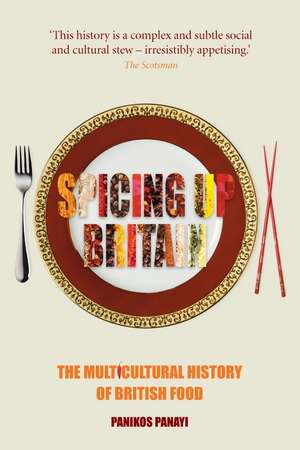Spicing up Britain: The Multicultural History of British Food
Autor Panikos Panayien Limba Engleză Paperback – 14 apr 2010
From the arrival of Italian ice-cream vendors and German pork butchers, to the rise of Indian curry as the national dish, Spicing Up Britain uncovers the fascinating history of British food over the last 150 years. Panikos Panayi shows how a combination of immigration, increased wealth, and globalization have transformed the eating habits of the English from a culture of stereotypically bland food to a flavorful, international cuisine.
Along the way, Panayi challenges preconceptions about British identity, and raises questions about multiculturalism and the extent to which other cultures have entered British society through the portal of food. He argues that Britain has become a country of vast ethnic diversity, in which people of different backgrounds—but still British—are united by their readiness to sample a wide variety of foods produced by other ethnic groups. Taking in changes to home cooking, restaurants, grocery shops, delis, and cookbooks, Panayi’s flavorful account will appeal to a wide range of readers interested in ethnic cooking, food history, and the social history of Britain.
“Wearing his twin hats of foodie and social historian, Panikos Paniyi can appall as well as engender salivation on his tour d’horizon of the multicultural history of British food. His book demonstrates convincingly that whether drawing on its former colonial and imperial possessions . . . or on its European neighbors, the openness of British society has truly enriched its diet and produced its present-day variegated cuisine.”—Washington Times
Along the way, Panayi challenges preconceptions about British identity, and raises questions about multiculturalism and the extent to which other cultures have entered British society through the portal of food. He argues that Britain has become a country of vast ethnic diversity, in which people of different backgrounds—but still British—are united by their readiness to sample a wide variety of foods produced by other ethnic groups. Taking in changes to home cooking, restaurants, grocery shops, delis, and cookbooks, Panayi’s flavorful account will appeal to a wide range of readers interested in ethnic cooking, food history, and the social history of Britain.
“Wearing his twin hats of foodie and social historian, Panikos Paniyi can appall as well as engender salivation on his tour d’horizon of the multicultural history of British food. His book demonstrates convincingly that whether drawing on its former colonial and imperial possessions . . . or on its European neighbors, the openness of British society has truly enriched its diet and produced its present-day variegated cuisine.”—Washington Times
Preț: 164.56 lei
Nou
Puncte Express: 247
Preț estimativ în valută:
31.49€ • 32.94$ • 26.16£
31.49€ • 32.94$ • 26.16£
Carte disponibilă
Livrare economică 12-26 martie
Livrare express 26 februarie-04 martie pentru 27.44 lei
Preluare comenzi: 021 569.72.76
Specificații
ISBN-13: 9781861896582
ISBN-10: 1861896581
Pagini: 288
Ilustrații: 50 halftones
Dimensiuni: 152 x 229 x 23 mm
Greutate: 0.45 kg
Editura: REAKTION BOOKS
Colecția Reaktion Books
ISBN-10: 1861896581
Pagini: 288
Ilustrații: 50 halftones
Dimensiuni: 152 x 229 x 23 mm
Greutate: 0.45 kg
Editura: REAKTION BOOKS
Colecția Reaktion Books
Notă biografică
Panikos Panayi is professor of European history at De Montfort University. His father was a Cypriot pastry chef working in London.
Cuprins
Preface
Part I: Introduction
1. British and Foreign Food
Part II: The First Ripples of Change, Circa 1850-1945
2. Immigration and the Emergence of 'Ghetto' Food
3. The Birth of the Foreign Restaurant
4. Changes in British Eating Habits
Part III: The Culinary Revoultion Since 1945
5. The Multiculturalization of Migrant Food
6. The Victory of the Foreign Restaurant
7. The Revolution in the Home
Part IV: Conclusion
8. Food and Multiculturalization
References
Bibliography
Acknowledgements
Photo Acknowledgements
Index
Recenzii
"This fills a gap between studies of British regional food and the legion of book on Anglo-Indian eating, as it has a much wider sphere of influences."
"His book demonstrates convincingly that whether drawing on its former colonial and imperial possessions (including the United States, with its ever-popular hamburger and other fast foods) or on its European neighbors, the openness of British society has truly enriched its diet and produced its present-day variegated cuisine."
"Next time someone fulminates about 'foreign invaders' or 'lazy immigrants' give them a copy of Panayi's book. Or buy them a meal."
"What makes Panayi's book distinctive and valuable is that he demonstrates his central point by examining the diverse dimensions of Britain's food supply and catering business over the past 150 years. . . . If Panayi has an agenda, it is to wake up ignorant Brits, to make them realise how central immigrants have been to the development of the UK's economy and culture in the last century and a half."
"Some books are researched. Others are lived. This book reflects both modalities and is strengthened by the author's life experience and sensitivity to cultural nuance. . . . Panayi's many examples, most of which delve deeply into the subtleties of food culture, are carefully researched, detailed, and convincing, giving the reader a taste of the dynamism of culinary interchange."
"Spicing up Britain shows in detail how Britons’ eating habits have been reshaped by immigration,globalisation and increased wealth. It also shows how other cultures have woven themselves into British society through the medium of food...The research for Spicing up Britain draws largely on social surveys and recipes - mostly from cookbooks - which prove to be valuable sources of information. The way in which Panayi draws on cookbooks is very ‘tasty’ and makes his book a really good read."










